In the fast-paced world of healthcare, having a compelling resume for Critical Care Nurse positions is essential to showcase your specialized skills and experience. Our collection of resume examples for Critical Care Nurse roles is designed to equip you with the tools you need to present your qualifications effectively. Whether you’re newly graduated or an experienced nurse, these curated examples will inspire you to create a resume that not only catches the eye of hiring managers but also highlights your passion for patient care and clinical excellence.
Critical Care Nurse Resume Examples – Free Download
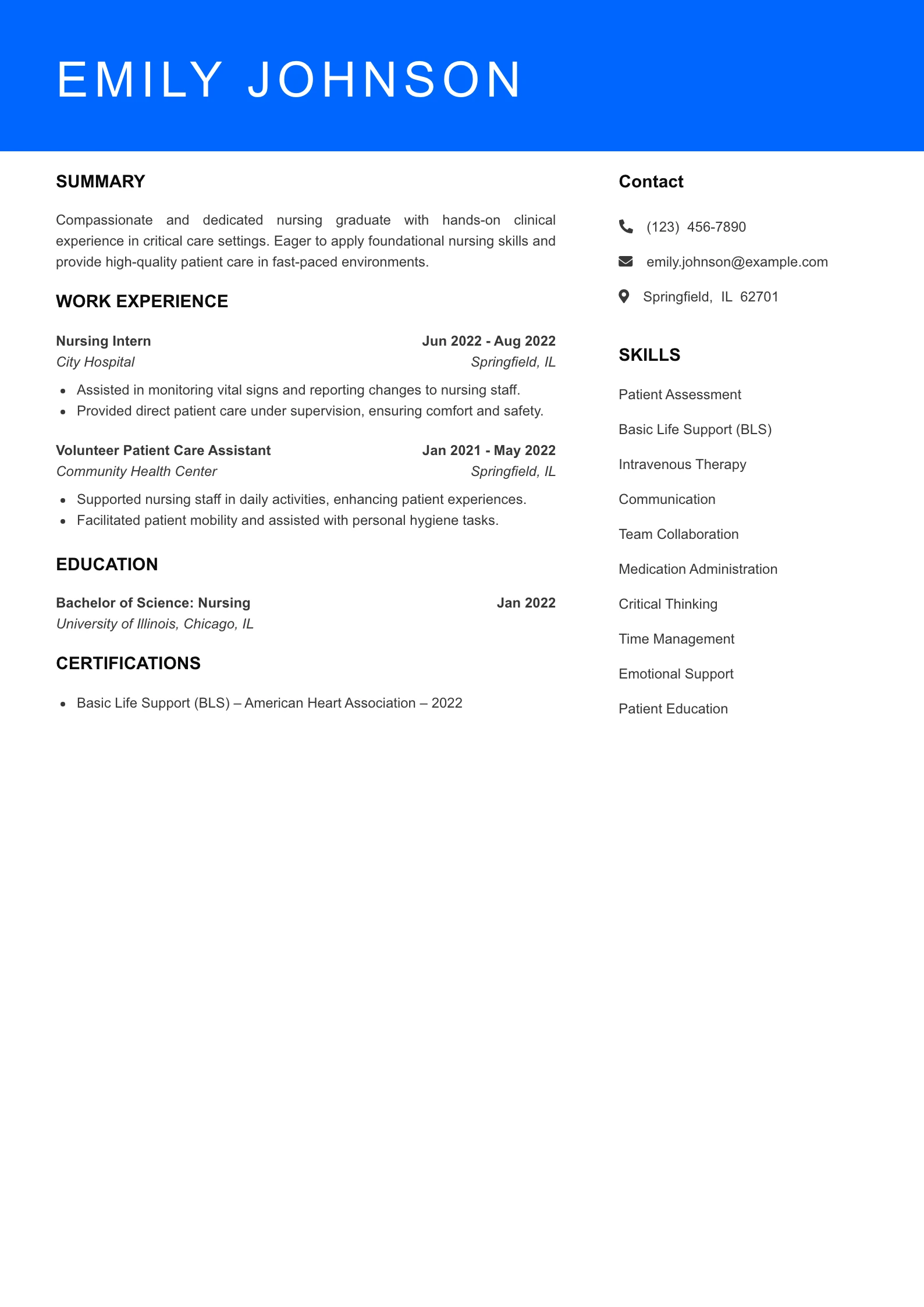

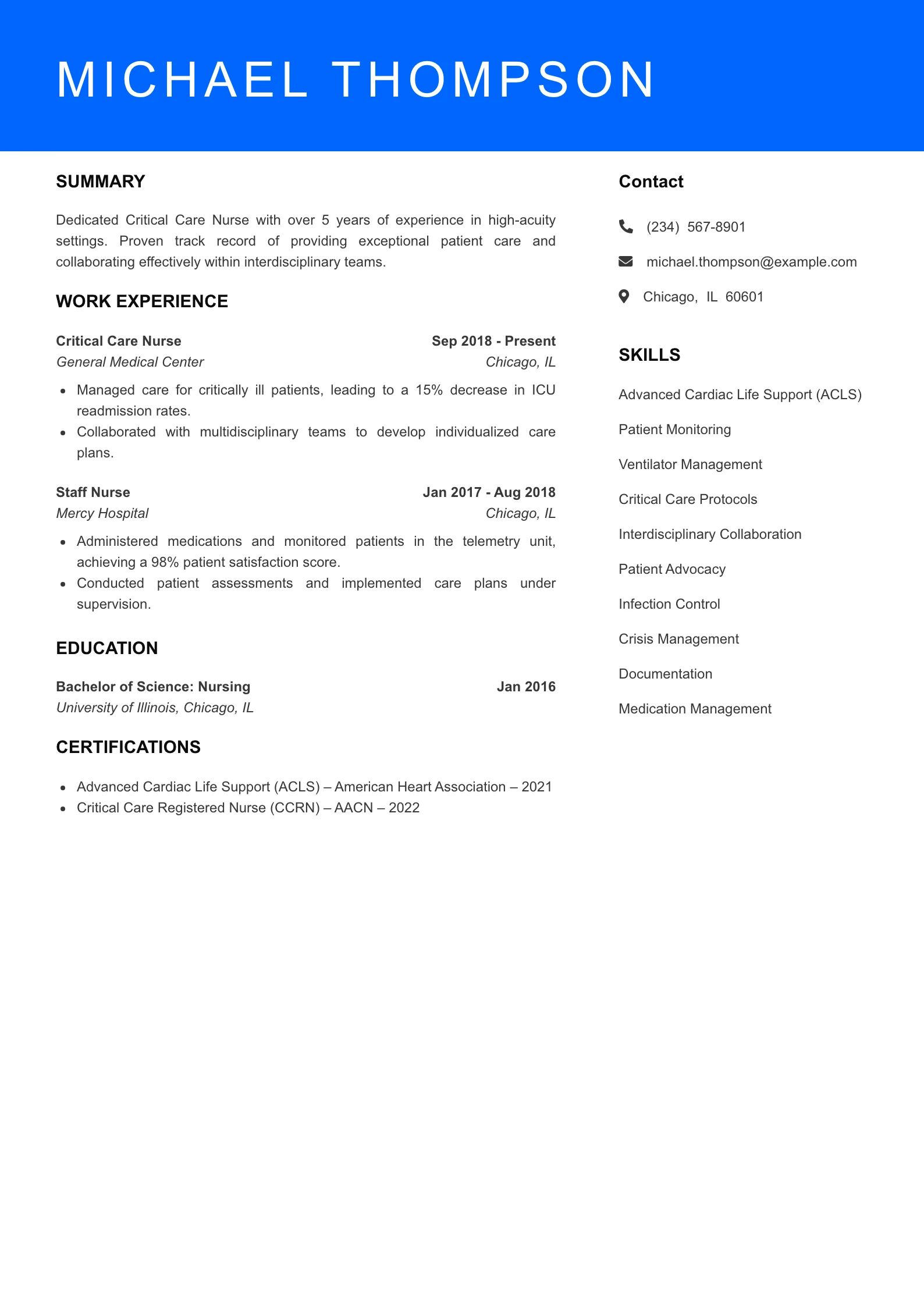
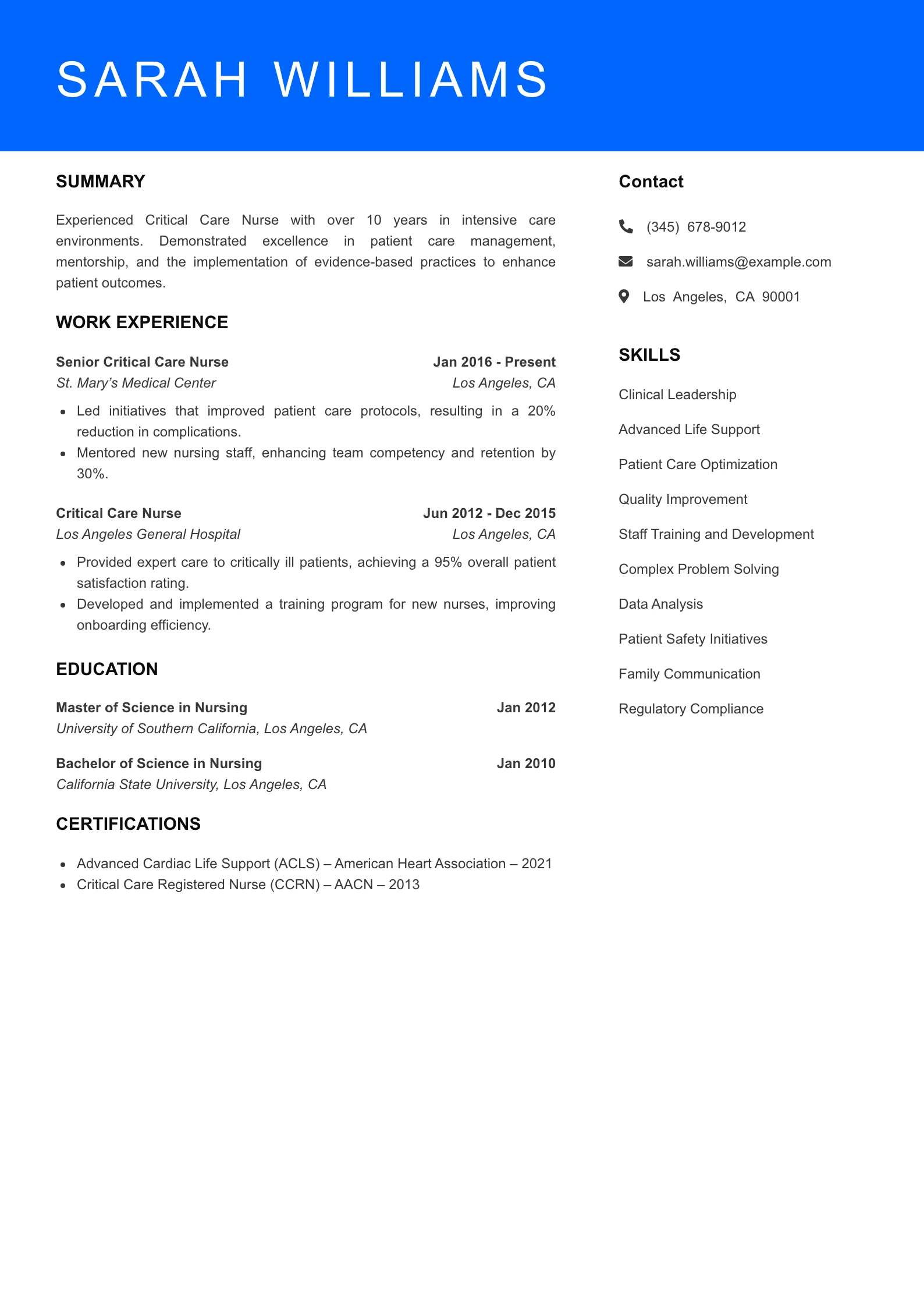
Critical Care Nurse Resume Examples
Entry Level Critical Care Nurse Resume Example
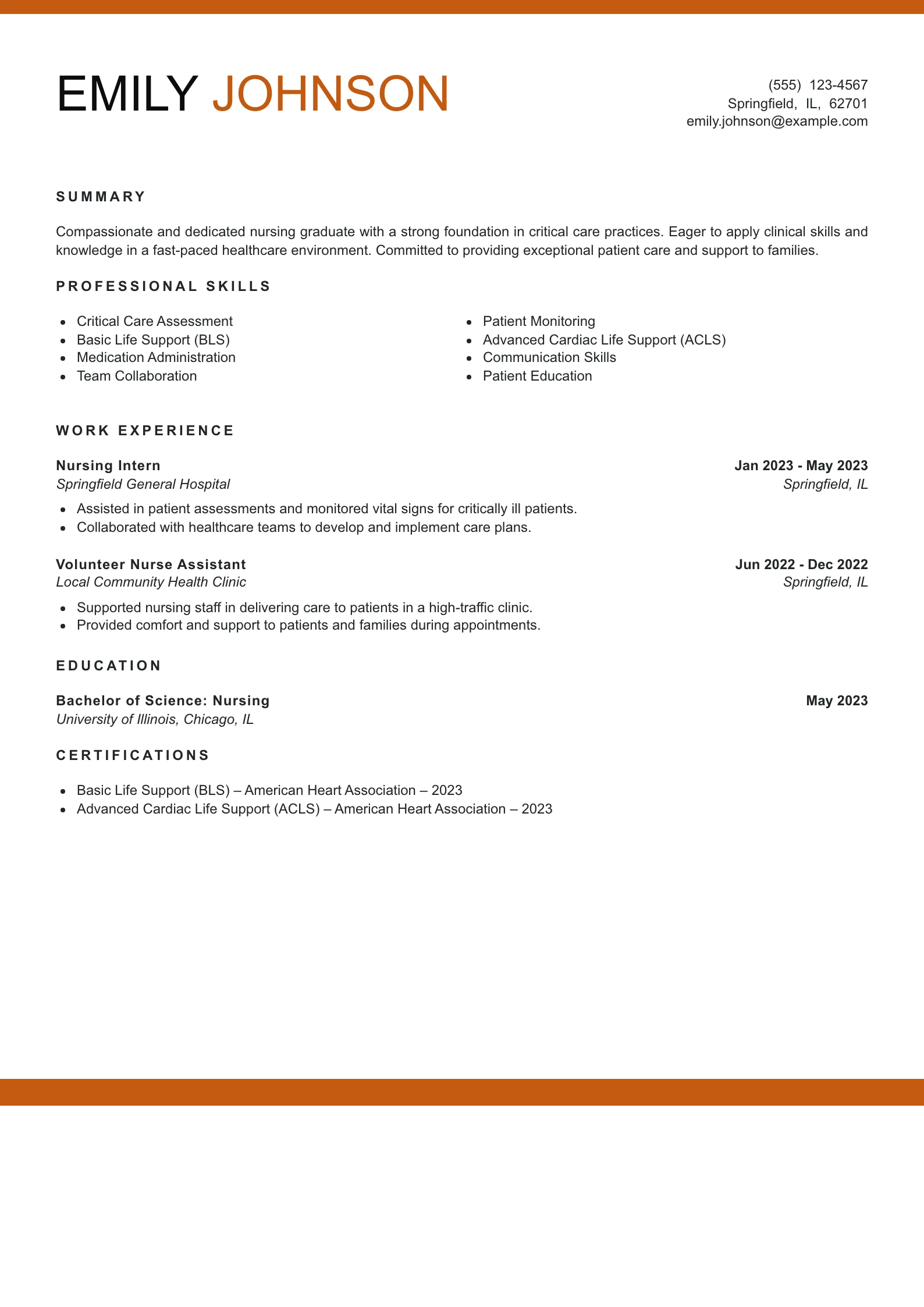
Why This Resume Works
- The summary clearly articulates Emily’s nursing background and eagerness to work in a healthcare environment, demonstrating her passion and commitment to patient care.
- Relevant skills listed, such as Critical Care Assessment and Advanced Cardiac Life Support, align well with the demands of a nursing role, showcasing her preparedness for the position.
- The work history includes impactful experiences that illustrate her ability to assist in patient care and collaborate within healthcare teams, highlighting her practical application of skills.
- As a recent graduate with internship experience, Emily’s resume effectively positions her as an entry-level candidate ready to transition into a nursing role.
- The tone is professional and compassionate, reflecting the qualities essential for a nursing career and making her a relatable candidate for hiring managers.
Mid Level Critical Care Nurse Resume Example
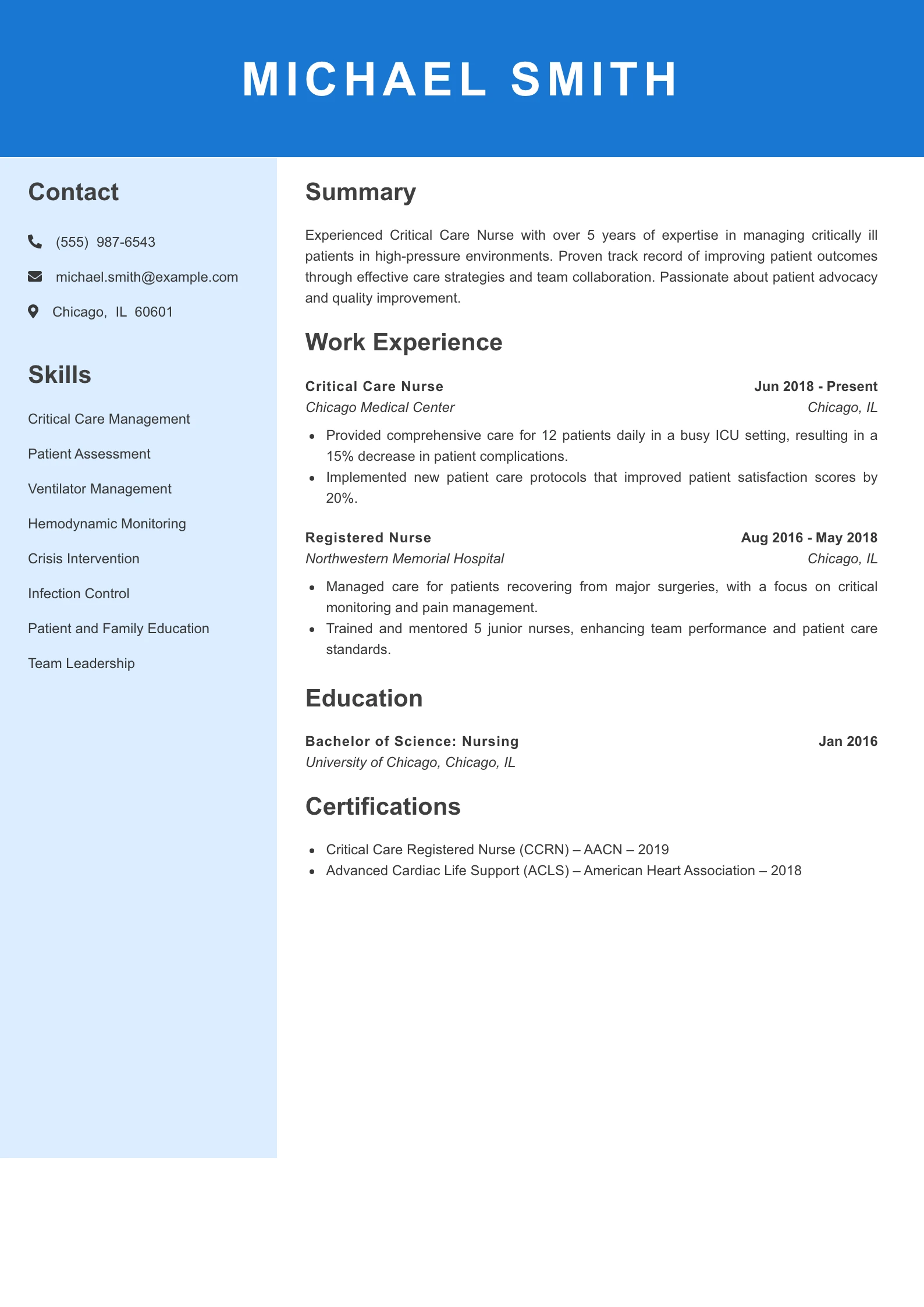
Why This Resume Works
- The summary clearly articulates Michael’s extensive experience and specific expertise in critical care nursing, making it immediately relevant to potential employers in the healthcare sector.
- The skills section highlights a comprehensive range of relevant competencies that align with the responsibilities of a critical care nurse, showcasing both technical and interpersonal skills essential for the role.
- The work history emphasizes impactful achievements, such as a measurable decrease in patient complications and improvement in patient satisfaction scores, demonstrating Michael’s ability to drive positive outcomes in high-pressure environments.
- The resume is tailored for a mid-level nursing position, effectively showcasing relevant experience while positioning Michael as a capable candidate ready for greater responsibilities.
- The clarity and professional tone of the resume convey a strong sense of confidence and dedication to patient care, enhancing the overall impression of Michael as a qualified candidate.
Senior Level Critical Care Nurse Resume Example
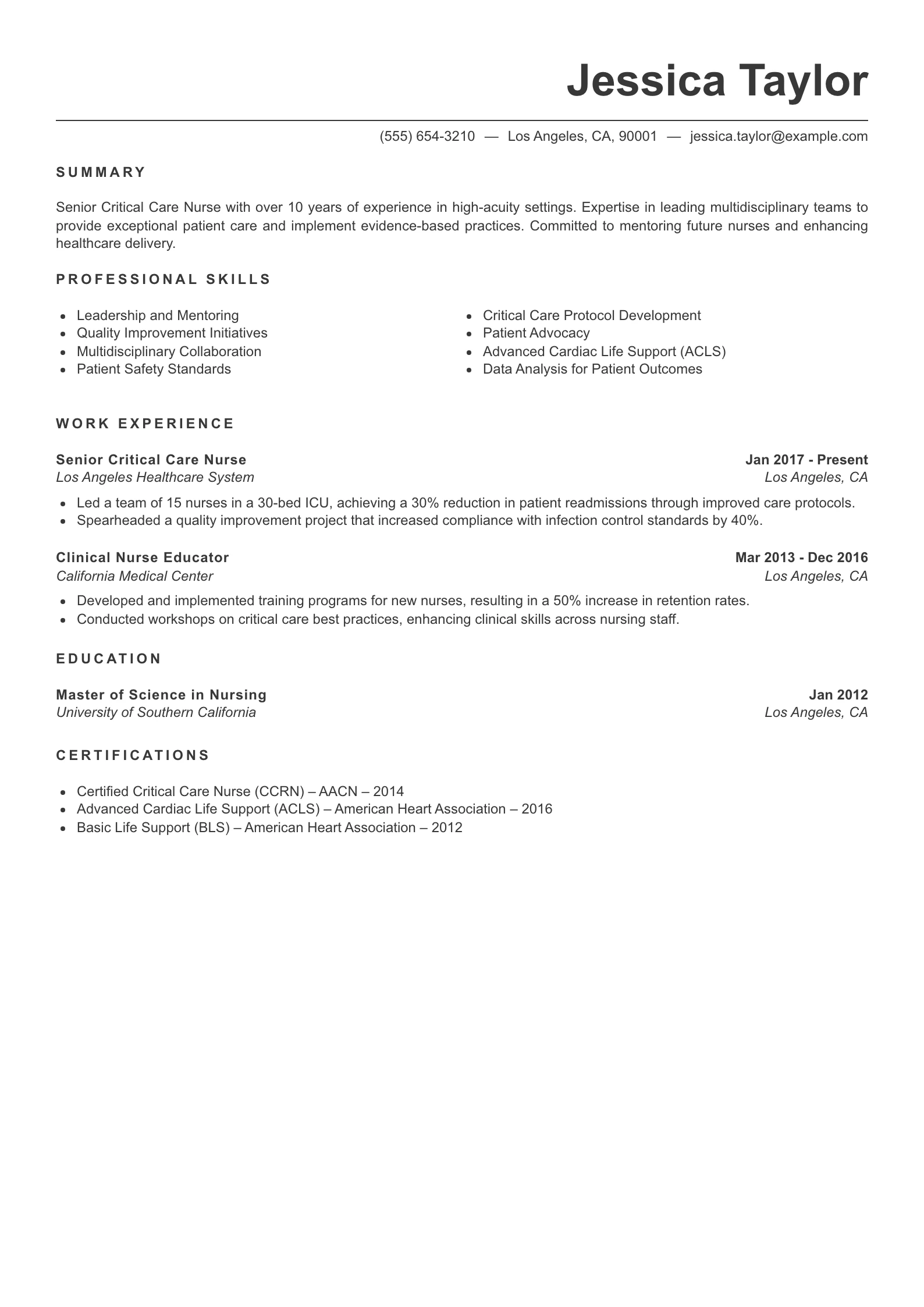
Why This Resume Works
- The summary clearly defines Jessica’s extensive experience and expertise in critical care nursing, establishing her as a seasoned professional in a high-stakes environment, which aligns well with senior roles in healthcare.
- The skills section effectively highlights both clinical and leadership capabilities, showcasing Jessica’s well-rounded qualifications that are relevant to advanced nursing positions.
- Her impactful work history includes specific achievements with quantifiable results, such as a 30% reduction in patient readmissions, demonstrating her ability to drive positive outcomes in patient care.
- The job fit is appropriate for a senior-level role, as evidenced by her leadership experience and the complexity of her responsibilities in managing a team and implementing quality improvement initiatives.
- The clarity and tone of the resume are professional and confident, utilizing action-oriented language that conveys a strong sense of impact and dedication to the nursing profession.
How to Craft a Strong Critical Care Nurse Resume
In today’s competitive healthcare landscape, a well-crafted resume is essential for Critical Care Nurses looking to stand out. Hiring managers typically seek candidates who demonstrate not only clinical proficiency but also strong interpersonal skills and the ability to thrive under pressure. This guide will help you effectively highlight your strengths and experiences to create a resume that captures attention.
1. Summary Statement
A strong summary statement sets the tone for your resume and provides a snapshot of your qualifications. For a Critical Care Nurse, this section should encapsulate your experience, areas of specialization, and key soft skills, along with relevant certifications.
When crafting your summary, focus on a confident and tailored tone that reflects your unique strengths. Aim for a results-focused narrative that captures your contributions to patient care and teamwork.
Here’s a placeholder for visual examples of summary statements:
Motivated recent nursing graduate with clinical experience in pediatric settings, committed to delivering compassionate care and effective patient communication.
Mid-Level:
Experienced Pediatric RN with 5+ years in fast-paced hospital environments, skilled in advanced critical care techniques and dedicated to improving patient outcomes.
2. Skills & Qualifications
Highlighting both core and soft skills is crucial for a Critical Care Nurse. Core skills may include advanced clinical competencies, while soft skills could encompass teamwork, communication, and critical thinking abilities.
To effectively identify the skills to include, review job descriptions and note the required qualifications. This can help you align your skills with the Applicant Tracking System (ATS) criteria that hiring managers use.
Here’s a placeholder for a skill highlight section:
- Pediatric patient care
- Vital signs monitoring
- Parent communication
- Electronic Health Records (EHR)
- IV administration
Top ATS Keywords for Critical Care Nurse
3. Work History
Your work history should emphasize relevant patient care experiences, metrics that demonstrate success, and any leadership roles or specialty procedures you’ve performed. Focus on responsibilities and achievements that highlight your critical thinking and ability to manage high-stress situations.
For formatting, use a reverse-chronological order and ensure each bullet point is quantified where possible. This can help prospective employers see the impact you’ve made in previous roles.
Here’s a placeholder for styled work history:
Intern, Children’s Hospital, New York, NY, June 2022 – Aug 2022
– Assisted with routine pediatric checkups
– Documented vital signs
– Supported nursing staff with daily care
Mid-Level:
Registered Nurse, St. Mary’s Medical Center, Boston, MA, Jan 2019 – Present
– Led pediatric triage for ER
– Administered vaccinations and monitored post-op recovery
– Trained new hires on pediatric protocols
4. Education
A solid educational background is fundamental for a Critical Care Nurse. Typically, candidates should hold a Bachelor of Science in Nursing (BSN) or an equivalent degree. Include the name of the institution, location, and graduation year when formatting your educational credentials.
Ensure that your degrees and certifications are clearly listed, as this will help hiring managers quickly assess your qualifications.
Here’s a placeholder for education examples:
Degree, School Name, City, State, Graduation Year
Example:
BSN, University of Washington, Seattle, WA, 2021
5. Additional Sections
Consider including optional sections in your resume to further showcase your qualifications. Certifications, language proficiency, and awards can set you apart from other candidates.
For instance, you might list advanced certifications like the Critical Care Registered Nurse (CCRN) or Basic Life Support (BLS).
Here’s a placeholder for additional sections:
- PALS (Pediatric Advanced Life Support) Certification – American Heart Association – 2022
- Basic Life Support (BLS) – 2021
6. Do’s and Don’ts
To ensure your Critical Care Nurse resume stands out, here are some practical tips:
Do:
– Tailor your resume for ATS
– Clearly demonstrate your impact
– Use industry-relevant terms
Don’t:
– Use generic statements
– Overlook the importance of soft skills
– Overuse buzzwords without substance
To enhance your resume further, consider exploring our collection of resume templates in Word format. These templates can help you get started on a polished and professional presentation of your qualifications.
As you construct your resume, you may want to look at specific examples relevant to your field. Check out our registered nurse resume examples to get inspired by successful formats and strategies tailored for healthcare professionals.
If you’re feeling unsure about how to summarize your skills and experiences, especially if you’re just starting your career, our guide on summary for resume for freshers can provide you with valuable insights on crafting an impactful introduction.
Finally, using the right action words for your resume can make a significant difference in conveying your achievements effectively. Don’t underestimate the power of strong verbs in capturing the attention of hiring managers!
Latest Articles

Carpenter Resume Example
—
by
Crafting an impressive Carpenter resume is essential for standing out in the competitive job market of 2026. Our collection of resume examples for Carpenter will guide you in showcasing your skills, experience, and accomplishments effectively. With…

Welder Resume Example
—
by
Crafting a compelling Welder resume in 2026 is crucial for capturing the attention of potential employers. With the right resume examples for welders, you can effectively showcase your skills, certifications, and hands-on experience. Explore our collection…

Top Skills for Blue Collar Jobs: Examples for Every Role
—
by
Most blue-collar jobs don’t require a long list of degrees, but they do require real, dependable skills—the kind that keep workplaces running, equipment operating, and projects moving forward. Employers today aren’t just looking for “hard workers”;…

Veterinary Receptionist Resume: Examples, Templates, and Writing Tips
—
by
A veterinary receptionist resume should reflect both compassion and organization — traits that define the heart of a veterinary front desk professional. The best type of resume for this role is the reverse-chronological format, as it…

Foreign Language Teacher Resume: Example, Template, and Writing Guide
—
by
Looking to stand out in your teaching career? A well-crafted resume can showcase not just your proficiency in a foreign language but also your soft skills, relevant certifications, and accomplishments in extracurricular activities. In this guide,…

Salon Manager Resume: Examples, and Expert Writing Tips
—
by
How to Write a Resume for an Experienced Salon Manager An effective salon manager resume highlights both leadership and operational excellence. For an experienced salon manager, the goal is to present a proven ability to manage…

